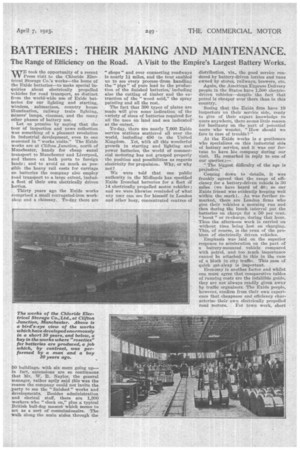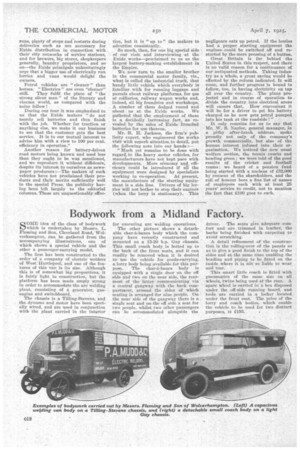BATTERIES THEIR MAKING AND MAINTENANCE.
Page 15

Page 16

If you've noticed an error in this article please click here to report it so we can fix it.
The Range of Efficiency on the Road. A Visit to the Empire's Largest Battery Works.
WE took the opportunity of a recent Press visit to the Chloride Electrical Storage Co.'s works—the home of the Exide batteries—to make special inquiries about electrically propelled vehicles for road transport, as distinct from the world-wide use of Exide batteries for car lighting and starting, wireless, submarines, country house illumination, railway train lighting, miners' lamps, cinemas, and the many other phases of battery use.
Let us premise by saying that the tour a inspection and news collection was something of a pleasant revelation in industrial development, even to one seasoned in "works visits." The Exide works are at Clifton Junction, north of Manchester, bandy for cheap canal transport to Manchester and Liverpool, and thence ex both ports to foreign lands ; and to avoid as much as possible the heavy rail costs for carriage on batteries the company also employ road transport to a large extent, include fleet of their own electrically driven lorries.
Thirty years ago the Exide works comprised a small corrugated-iron workshop and a chimney. To-day there are
50 buildings; with six more going vain fact, extensions are so continuous that Mr. W. B. Naylor, the general manager, rather aptly said this was the reason the company could not invite the .party to see the " finished" works and developments. Besides administration and clerical staff, there are 1,300 workers who "clock on," plus a typical British bull-dog mascot which seems to act as a sort of commissionaire. The walk along the main aisles through the
" shops " and over connecting roadways is nearly 1i miles, and the tour enabled us to see every process from handling the "pigs" of pure lead to the production of the finished batteries; including also the cutting of timber and the extraction of the "wood acid," the spray painting and all the rest.
The fact that 300 types of plates are made will give some indication of the variety of sizes of batteries required for all the uses on laud and sea indicated` at the outset.
To-day, there are nearly 7,000 Exide service stations scattered all over the world, including 450 in the United Kingdom. Yet, with all this wonderful growth in starting and lighting and power batteries, the world of commercial motoring has not grasped properly the position and possibilities as regards electricity for propulsion. Why, or why not?
We were told that one public authority in the Midlands has specified Exide Ironclad batteries for a fleet a 14 electrically propelled motor vehicles ; and we were likewise reminded of what any user can see for himself in London and other busy, concentrated centres. of
distribution, viz., the good service rendered by battery-driven lorries and vans owned by stores, railways, brewers, etc.
Again, the American Express Delivery • people in the States have 1,500 electricdriven vehicles—despite the fact that petrol is cheaper over there than in this country.
'Seeing that the Exide firm have 10 inspectors on their service side, ready to give of their expert knowledge to users anywhere, there seems little reason for hesitancy on the part of potential users who wonder, "Row should we fare in case of trouble?"
At the Exide works is a gentleman who specializes on this industrial side of battery service, and it was our fortune to have his company during our visit. He remarked in reply to one of our queries.;.—
" The biggest difficulty of the age is prejudice."
Coming down to 'details, it was frankly agreed that the range of efficiency for a battery-driven vehicle is 30 miles (we have heard of 40; so our Exide friend was evidently keeping well within the mark). As was further remarked, there are London firms who give their vehicles a morning run and then during the lunch interval put the batteries on charge for a 50 per cent. "boost" or re-charge, during that hour. Thus the afternoon work is carried on without time being lost on charging. This, of course, is the crux of the problem of electrically driven vehicles.
Emphasis was laid on the superior response to acceleration on the part of a battery-mounted -vehicle compared with petrol, and too much importance cannot be attached to this in the case of a block in city traffic. This ease of quick get-akvay is important.
Economy is another factor and whilst one must agree that comparative tables of running costs are the infallible guide. they are not always readily given away by traffic organizers. The Exide people, however, confirm from their own experience that cheapness and efficiency characterize their own electrically propelled road motors. For town work, short runs, plenty of stops and restarts during deliveries such as are necessary for Exide distribution in connection with their City networks of service stations, and for brewers, big stores, shopkeepers generally, laundry proprietors, and so on—the Exide principals unhesitatingly urge that a bigger use of electrically run lorries and vans would delight the owners.
Petrol vehicles are " cleaner " than horses, " Electries " are even "cleaner"
still. They fulfil the place of "the -strong silent man" of the literary and cinema world, as compared with the noisy fellow!
During our tour it was emphasized to us that the Exide makers "do not merely sell batteries and then finish with the job. Whether for traction or anything else, we make it our business to see that the customer gets the best service. It is to our mutual interest to advise him with a view to 100 per cent. efficiency in operation,"
Another -reason for battery-driven road motors being known and Used less than they ought to be was mentioned, and we reproduce it without diffidence, despite its interest to ourselves as newspaper producers:—The maker a of such vehicles have not proclaimed their products and .their merits sufficiently well in the special Press, the publicity having been left hugely to the editorial columns. These are unquestionably tiffee
tive, but it is " up to" the makers to advertise consistently.
So much, then, for one big special side of our visit and interviewing at the Exide works—proclaimed to us as the largest battery-making establishment in the Empire.
We new turn to the smaller brother in the commercial motor family, viz., what is called the industrial truck, that handy little vehicle which everybody is familiar with for running luggage and parcels about railway platforms, for Ilse at collieries, railway wagon works .ancL indeed, all big foundries and workshops_ A number of them dodged round and about us at the Exide worts. We gathered that the employment of these is a decidedly increasing fact, as revealed by the sales of Exide Ironclad batteries for use thereon.
Mr. IR. H. Jackson, the firm's publicity expert, who engineered the works visit with superb attention,to detail, put the following note into our hands:—
"Much yet remains to be done with regard: to the heavy motor vehicles, for manufacturers have not kept pace with developments. More eeOnomy and, efficiency could be introduced if all the equipment were designed by Specialists
working in co-operation. At present, -the manufacture of the starting equipment is a side line. Drivers of big lorries will not bother to stop their engines (when the lorry is stationary). This negligence eats up petrol. If the lorries had a prpper starting equipment the engines .could be switched off and restarted by the mere pressing of a button.
Great Britain is far behind the United States in this respect, and there is no valid reason for a continuance of our antiquated methods. Taking inditetry as a whole, a great saving would be effected by the reform indicated. It will come, and further progress is bound to follow, too, in having electricity on tap all over the country. The plans projected and in course of operation to divide the country into; electrical areas will ensure that. How convenient it will be for a driver to get his battery charged as he now gets petrol pumped into his tank at the roadside! "
It only remains for us to say that Mr. W. S. Naylor, general manager, in a pithy after-lunch address, spoke proudly not only of the company's growth commercially, but also of the human interest infused into their organization. We noticed the now usual welfare section, the tennis courts and bowling green ; we were told of the good results of the cricket and football teams ; we heard of a pension fund being, started with a nucleus of 132,000 by consent of the shareholders, and the roll of honour bore a fine list of names of employees each with at least 25 years' service to credit, not to mention the fact that £100 goes to each.




























